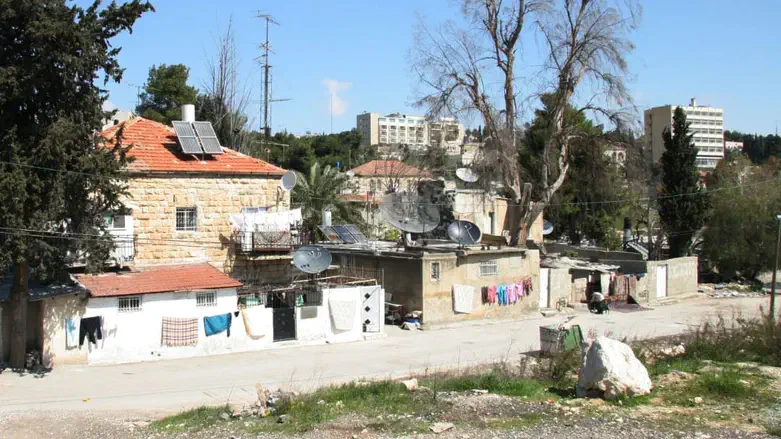
Jewish lawyers are apparently acting as proxies or straw men for the Palestinian Authority (PA), seeking to purchase property from Jews in the Shimon HaTzadik neighborhood in East Jerusalem. Arutz Sheva-Israel National News spoke with Chaim Silverstein, chairman of Keep Jerusalem Advocacy Organization, whose members are monitoring the renewed trend.
"This is a neighborhood that was Jewish until 1958. The Jordanians took over and Arab families were placed on Jewish properties. For many years there have been organizations that have been trying to redeem the land and have succeeded to a certain extent. "Now the municipality wants to repopulate the neighborhood and develop the area, and there are those who recognize the potential," explains Silverstein, noting that with the intention of renovating the neighborhood, a kind of race to take over the land and assets has begun.
"This is a real estate race that is also political, between supporters of Hamas and the PA and Jews who say that this is a neighborhood that was founded by Jews about a hundred and fifty years ago," emphasizes Silverstein, describing the trend of lawyers seeking to purchase real estate in the neighborhood.
"There are ideological lawyers who want to return, as they say, the properties to the Arabs and leave them in the hands of the Arabs." An example of this is former Attorney General, Michael Ben Yair, who "declared that he inherited part of the neighborhood from the Georgians and is interested in transferring it to the Arabs." In addition, there are lawyers who will represent anyone who agrees to pay a high rental fee, and there are those who represent Arabs for ideological reasons, but when they reach out to the Jewish property owners and heirs, they do not identify themselves as representing Arab clients.
"As of 2021, the area has been registered in the land registry and it is possible to know who the owner is. These lawyers do research, locate the heirs, approach them and say that they have a client, and do not necessarily say that these are Arabs buyers. They offer inflated amounts. Some people are naive and are willing to sell to anyone," says Silverstein, noting that "there are also descendants of religious Jews, who moved to the left side of the map and are interested in selling to Arabs."
According to Silverstein, this is definitely a new trend. He personally knows several people who taking part in the fight against this trend and are offering sums to purchase real estate in the neighborhood. More than once when they offer a sum they are told that they have already been offered a sum 50 percent higher by some lawyer, and these are the same Arab representatives.
The response to the trend, says Silverstein, also requires the wooing of ideological wealthy individuals who are willing to invest in the neighborhood, and in his assessment, this is an investment that will ultimately be profitable for them in the future. The goal is to reach dozens or hundreds of real estate heirs in the neighborhood, before the lawyers representing the Arabs do, thereby redeeming the neighborhood's lands.
He further emphasizes that "some of the heirs are Zionists and do not want the part that belonged to their grandparents to fall to hostile hands. Therefore, we need to approach them both publicly and privately and explain to them the importance of returning the neighborhood to Jewish hands."
"There is a moral level of doing justice here, because these are assets that were stolen and confiscated by the Jordanians without compensation, and in addition, we are preventing hostile elements taking over a neighborhood that was occupied by the UN and Jordan."
He believes that good Jews will be able to stop the trend with determined action. Among other things, Silverstein notes the importance of informing municipal and government officials about the trend and its implications.
When asked what answers he receives from the relevant authorities, Silverstein says, "There is a lot of ignorance on the subject. The Jerusalem Municipality is about to rent a property in the neighborhood from an Arab entity for at-risk Arab youth, and if they do this, it will spoil the entire process of redeeming the property, because it will bring in hostile elements and criminals. It could spoil the entire character of the neighborhood and drive away investors who want to return the neighborhood to Jewish hands."
As part of the debate over the claim that equality before the law requires giving Arabs as well as Jews the opportunity to purchase, a claim that could reach the High Court of Justice, Silverstein says that, it has also been proven to the court that the steps taken to bring about the purchase of property by Arabs were taken illegally, whether through an inflated valuation, various defects in the contract, lack of good faith, concealment of the identity of the owner, and so on.
In conclusion, he says, raising the Zionist issue should also be part of the challenge, as it is a matter of the future existence of Jerusalem in the face of the tendencies of hostile elements fighting against the Jewish character of the capital of Israel.